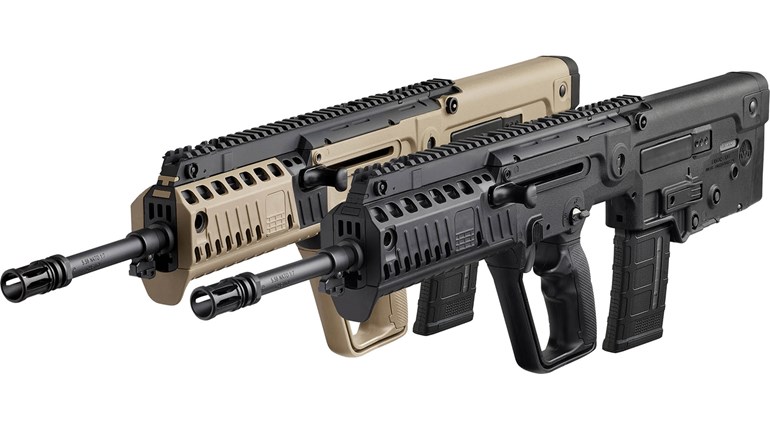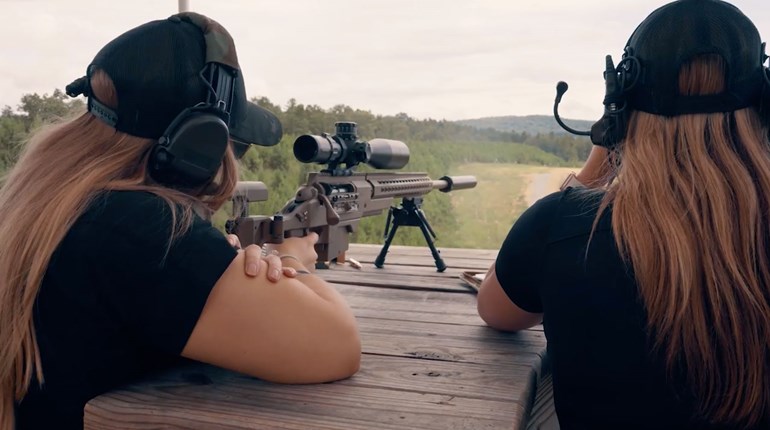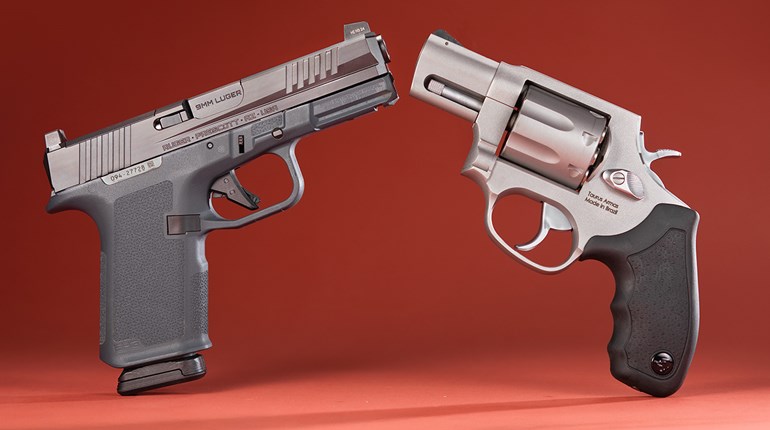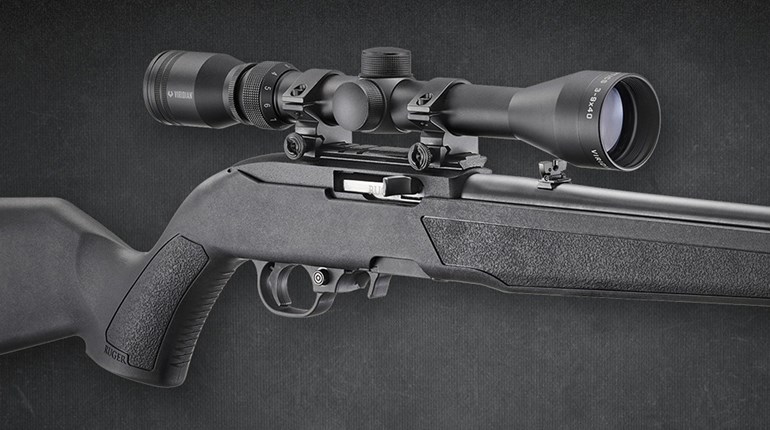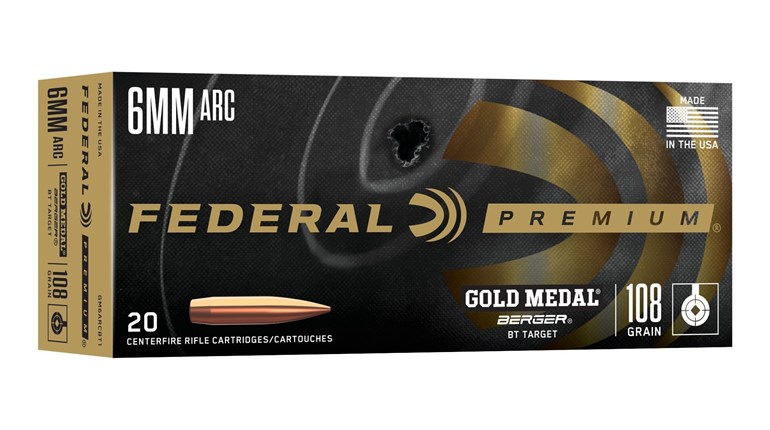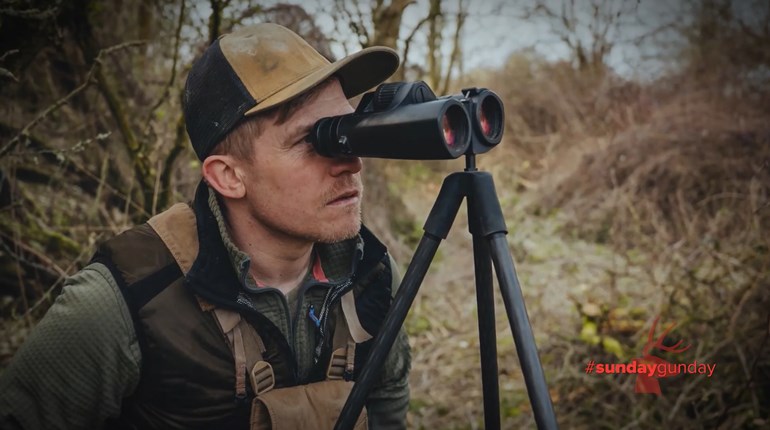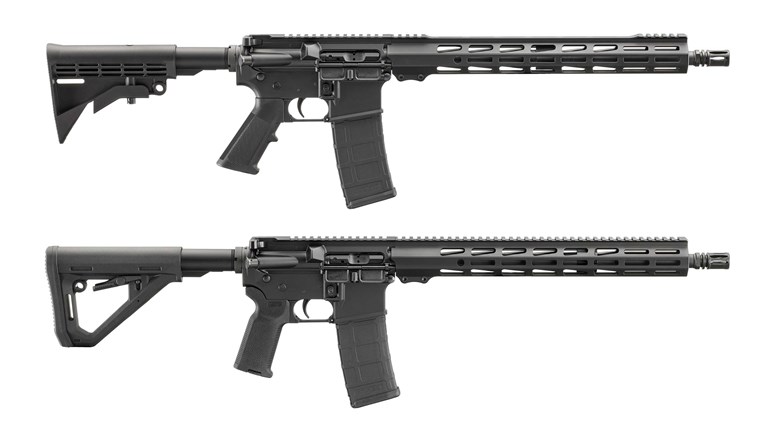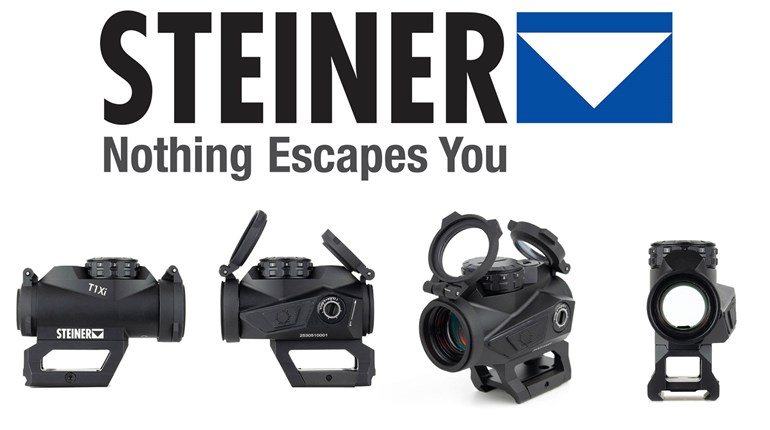
Shooting is always fun, and shooting unique guns on a perfect fall day in a beautiful spot is impossible to beat. The 2015 Bullpup Shoot was all of that and more. Organizers chose The Site Training facility, located in the rolling green hills of western Illinois. Attendees young and old enjoyed discovering the unique advantages of rifles like the IWI Tavor, the Steyr AUG and many other models of this futuristic—yet not really all that new—design. New accessories were announced, brass was spent and smiles were rampant. While many attendees were shooting bullpup guns for the first time, the event itself was evidence that bullpups are here to stay.

What is a Bullpup?
Perhaps, like some of you reading this, many 2015 Bullpup Shoot attendees wanted to know: What exactly is a bullpup rifle? It’s a firearm design that is often described as placing the action behind the trigger group. Traditional designs like the AR-15 place the magazine well, ejection port, bolt and barrel/chamber in front of the trigger. That leaves the buttstock with a lot of unused space. By moving the action components into the buttstock, the overall length of the design is dramatically reduced, yielding a shorter, more-compact firearm.
Since the design is different, so are the ergonomics. The Bullpup Shoot provided opportunities for people like Mike Weiner of Pecatonica, IL, to get a first-hand introduction to the bullpup scene. “I’m here to try before I buy,” he told me. That’s always a good idea. Weiner was about to discover a whole new world of practical benefits found in the bullpup design.

Bullpup Benefits
Compact size is the primary purpose and benefit of the bullpup design. For example, while a typical IWI Tavor bullpup rifle and an AR-15 carbine would both have 16-inch barrels, the Tavor is almost 20 percent shorter overall. A shorter gun yields real-world benefits for both shooters and hunters.
For tactical use inside buildings, a shorter gun allows the operator to move through doorways and halls more fluidly, yet retain the velocity afforded by a 16-inch barrel. Concealment is easier as well. A shorter gun makes for quicker handling and movement from target to target.
The shorter overall length benefits hunters and anyone needing to move with a firearm, too. Getting in and out of vehicles is obviously easier. If you’ve ever slung an AR-15 on your chest while riding an ATV, you’ll really appreciate the shorter length of a bullpup. Jump off the ATV to run across a field, and your knees don’t take quite the beating. If you find yourself holding your rifle at ready for extended periods of time, you’ll be thankful about not having the muzzle weight cantilevered as far out.
Using the IWI U.S. Tavor as an example, the shooter essentially gets the compact form factor of a 10-inch short-barreled rifle (SBR), but gives up nothing in bullet velocity because the bullpup maintains the carbine-length barrel. All wins, and today I see bullpups at almost every gun shop, gun show and recreational shoot. It wasn’t always that way.

Bullpups Past
While the bullpup design is more than 100 years old and the British military has been experimenting with or using it since the 1950s, we can thank Hollywood for bringing the design to America’s attention. The Steyr AUG started showing up in movies like “Octopussy,” “RoboCop” and “Die Hard” in the 1980s. It also made appearances on TV in cult classics like “Miami Vice” and “The X Files.” It was this spotlight that first drew a young Sven Jonsson to the AUG. When he was old enough, he purchased one and fell in love with the ergonomics of the short bullpup rifle. He and other like-minded enthusiasts starting showing up at practical rifle events with their unusual guns, and acceptance among the shooting public slowly grew. Fast-forward to today, and we find Jonsson as the organizer of the Bullpup Shoot and owner of Manticore Arms, a company specializing in accessories for the AUG and the Tavor.
The 1990s saw the introduction of bullpups both big and small. Barrett gave us the .50 BMG M90/M95, while FNH USA delivered the unique P90/PS90 in 5.7x28 mm. The P90 gained visibility on the TV series “Stargate: SG1” and numerous “Call of Duty” games, and made its biggest impact when the U.S. Secret Service adopted it to replace the Uzi as the department’s issue submachine gun in the 1990s. The little FN gun is one of the most fun guns I’ve ever had the opportunity to shoot—I’ve even successfully hunted hogs with it.
Even more bullpups came our way at the start of the 21st century. FNH came out with the F2000/FS2000, a forward-ejecting gun in 5.56 NATO. The American manufacturer Kel-Tec turned quite a few heads when it started selling the 7.62 NATO RFB in 2009, and at press time, the company’s new 5.56 NATO RDB platform appears to be on the cusp of release.

In 2007, the Stealth Recon Scout bolt-action precision rifle was unveiled by Desert Tactical Arms (now Desert Tech). A bullpup design in .338 Lapua Mag., this gun was a game-changer. With a trigger worthy of any precision rifle, interchangeable calibers and one-hole groups, it created a whole new level of respect for the bullpup genre, not to mention a new group of talented devotees.
In 2010, the first Bullpup Shoot was organized by Manticore Arms and RAT Worx. Thirty-nine people showed up, and the event has grown from there. The mere existence of that first shoot was a sign of the times and of good things to come for bullpup fans. A few months later, Kel-Tec shook things up with the introduction of a bullpup 12-gauge shotgun sized perfectly for home defense. The hotly demanded KSG has a double-tube magazine, creating an impressive 12-round capacity. UTAS followed with its 12-gauge UTS-15, increasing capacity to 15 rounds and offering models with lights and lasers built-in to the fore-end.
The bullpup concept was gaining both acceptance and ground here in America, but it wasn’t mainstream yet. One more introduction would push us over the tipping point, though. It would come with a name most of us wouldn’t know how to pronounce.

Maybe it was the Israeli pedigree, or its Israeli Defense Forces battle-proven credentials. Perhaps it simply nailed the ergonomics better than its predecessors. The “Call of Duty” placement certainly didn’t hurt. Whatever the reasons, when Israel Weapon Industries (IWI) released the Tavor (tuh-VOR) SAR here in the USA, American gun buyers didn’t hold back. In just two short years, IWI has sold more than 40,000 Tavors. That may well be a record for any new carbine launch and even more remarkable when one considers the nearly $2,000 MSRP.

At launch, the Tavor was available in America chambered in 5.56 NATO. Today you can buy a conversion kit to run 9 mm through it, too. It’s a versatile platform. I’ve run Tavors in classes and even shot steel at 600 yards with them. I’ve worked with trainers who brought Tavors to classes in Oregon, Utah and Texas. I’ve been hog hunting with thermal optics on a Tavor. This bullpup takes the platform beyond novelty to a place worthy of real respect as a defensive firearm.
While at the Bullpup Shoot, I spoke with attendee Richard Comer. A Tavor owner, he’s sold on the bullpup concept. “I work for a police department on a college campus. Everything I do is in a confined space. These are perfect.” The Tavor continues to draw more and more interest, and the longest line at the 2015 Bullpup Shoot was comprised of people eager to shoot it. As Americans rapidly embraced the Israeli gun, bullpup design itself was embraced
as mainstream.

Bling for the Bullpup
With the mainstream acceptance of bullpups came aftermarket support. Manticore Arms got started because Sven Jonsson saw a need for an improved charging handle for his Steyr AUG. Today, Manticore’s Steyr accessories include multiple charging handles and a brass deflector. The popularity of the Tavor created a whole new set of opportunities for aftermarket inventors and designers.
Manticore has created an entire line of accessories and improvements for the Tavor, literally from end to end. A curved buttplate shortens the rifle’s length-of-pull and improves this point-of-contact for the shooter. An all-metal, drop-in replacement ambidextrous-safety lever replacement is a popular item to swap for the factory’s plastic model. Some people find the top rail on the Tavor to be lower than what they’re used to on an AR-15, so Manticore offers its Overwatch replacement rail. It’s roughly a half-inch taller than stock, and brings AR-15-style ergonomics for optics to the Tavor. The stock charging handle on a Tavor protrudes and can get caught on clothing and other gear, so Manticore created the Switchback charging handle. Similar to a Bushmaster ACR charging handle, it folds parallel with the rail until you need to grab and pull to load the rifle. The ARClight fore-end offers users the ability to mount accessories—including flashlights with a 1-inch-diameter body—internally and provides rail-attachment points along the fore-end. Manticore even offers its own “zero-flash” muzzle device.

RAT Worx connected with Manticore Arms to develop something I’ve wanted to play with since I first heard of its existence: the ZRX 9 mm Tavor suppressor. I got to handle the 2015 shoot; it’s impressive.

What’s Next?
With the announcement of the MDR platform, Desert Tech started stoking the embers of anticipation with the company’s imminent entry into the semi-automatic bullpup world. This forward-ejecting modular rifle is designed to quickly swap calibers, and we’re not just talking .223 Rem.-length rounds. The initial MDR release will include 5.56 NATO, 7.62 NATO and 7.62x39 mm versions with 16-inch barrels. Having shot a prototype, I’ll say it showed great potential. Along with some other exciting variants, a .300 BLK and SBR versions are already in the works and should be available later in 2016.
IWI continues to be the center of gravity in the bullpup universe. Thanks to the bullpup design benefits and remarkable reliability of the Tavor, law enforcement purchases are on the rise. As a hunter, I’m excited about IWI’s release of a .300 BLK-model Tavor. It will have two accessible gas settings, one for running supersonic rounds, the other for subsonic. As you’re reading this, the .300 BLK model should be introduced and headed to stores. A complete, user-friendly .300 BLK conversion kit for 5.56 NATO or 9 mm Tavors will follow shortly, and will include tools and spare parts.

The innovation around bullpups these days is nothing short of amazing. New shooters and old, hunters and law enforcement, weekend warriors and professionals are buying or creating bullpup rifles and enhancements like never before. It’s been said that we’re living in the Golden Age of the bullpup, but I think we’re just at the beginning. No doubt, the bullpup is here to stay.













